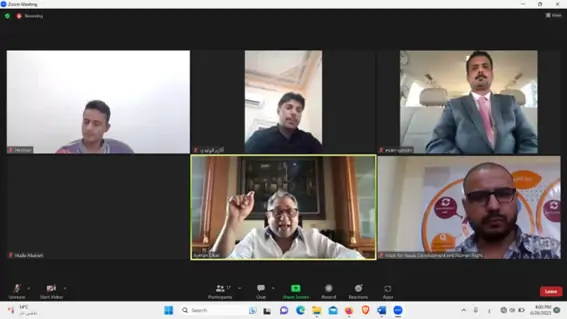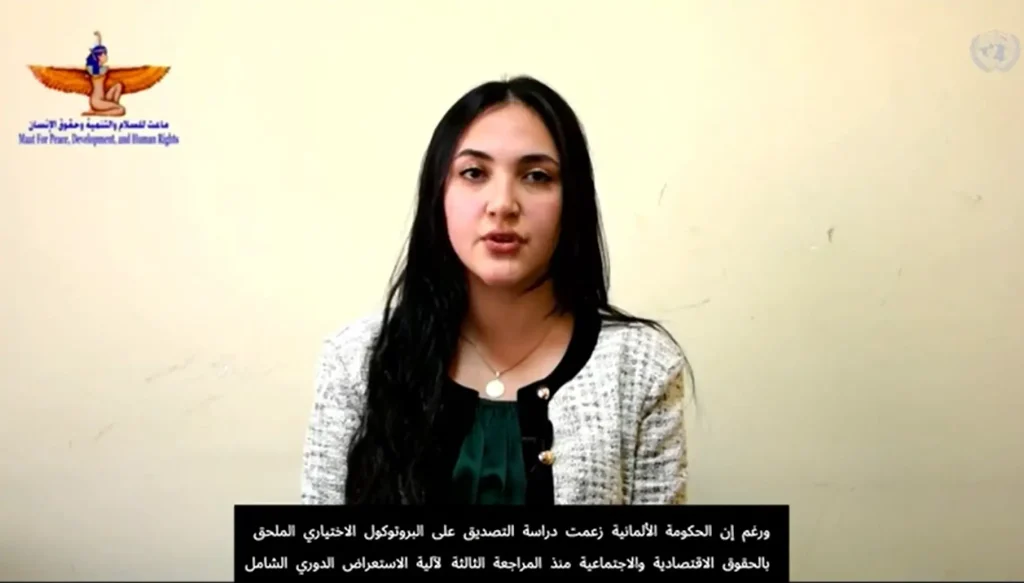Maat Foundation for Peace, Development and Human Rights held a virtual event entitled “Death inside the prisons of the Houthi group in Yemen” on Monday, June 26, 2023, on the sidelines of the 53rd Business of the Human Rights Council, and on the sidelines of the International Day in Support of Victims of Torture. A group of human rights experts in the Arab region and Yemen participated in this event. They are Mr. Ayman Aqeel, a human rights expert, president of the Maat Foundation for Peace, Development and Human Rights, and lawyer Huda Al-Sarari, head of the Defense for Rights and Freedoms Organization. And Issam Al-Shaeri, head of the Reports and International Organizations Department at the Ministry of Legal Affairs and Human Rights in Yemen, along with those released from the prisons of the Houthi group, namely the journalist Akram Al-Walidi and the journalist Hisham Tarmoum. All speakers expressed their solidarity with the journalists liberated from the prisons of the Houthi group, who were recently released as part of a prisoner exchange deal. They also demanded the need to continue documenting the violations that lead to death in the prisons of the Houthi group, including torture and medical negligence. And ensuring accountability and the non-impunity of the perpetrators for the crimes committed in the areas of the group.
The event dealt with the role of international mechanisms for the protection of human rights in areas under the control of the Houthi group, in addition to the gendered nature of the violations in the group's prisons, with reference to the case of the detainee in the group's prisons, Intisar Al-Hammadi. Maat also listened to live testimonies from Yemeni journalists who were arrested in the prisons of the Houthi group and who were witnesses to it during their detention. Those who were personally subjected to it, including ill-treatment, severe beatings, torture, and deliberate medical negligence leading to death.
In this context, Ayman Aqeel, the international human rights expert and head of the Maat Foundation, said that despite the promises made by the Houthi group to adhere to the principles and provisions of international human rights treaties, it did not comply with these principles in the areas it governs by force of arms. Aqil pointed to the limited and shortcomings of the role of international human rights mechanisms. Human rights, both contractual and non-contractual, in dealing with the violations committed by the Houthi group in the areas under their control. He noted that the concluding observations of the Committee on Economic and Social Rights and the Committee on the Elimination of All Forms of Discrimination against Women are almost devoid of any reference to human rights violations in the group's areas of control. Aqil noted that the continued smuggling of weapons to the Houthi group is what makes the group continue to kill civilians. He drew attention to the fact that the Human Rights Council, Special Procedures and the Office of the High Commissioner for Human Rights mentioned only a few of the violations committed by the Houthi group. Aqeel concluded that international mechanisms have not succeeded in protecting human rights in Yemen, especially in areas controlled by the Houthis.
For her part, lawyer Hoda Al-Sarari said that the Houthis use prisons and detention centers as a tool of oppression and intimidation, and that they practice abuse and torture as a means to extract confessions from detainees. She also drew attention to the need to guarantee women's rights in all fields, including prisons, in order to achieve stability and sustainable peace and achieve the agenda of women, peace and security. Al-Sarari drew attention to the grave violations that activist Intisar Al-Hammadi, who is currently detained in the group's prisons, was subjected to. She also confirmed that Al-Hammadi is still subjected to inhumane practices after she was sentenced to five years in prison, such as verbal and physical abuse, which prompted her to attempt suicide.
And she called for denouncing the violations against women in the areas of the Houthi group, and working to put an end to them. She also warned that the gender violations that women are subjected to in the prisons of the Houthi group contradict the agenda of women, peace and security, and undermine the promotion of women's participation in peace and security. It called on the international community and human rights institutions to work seriously to stop the violations, and noted that achieving justice for those affected requires an end to these violations. It also referred to the need for accountability for crimes committed against women in the group's control areas. It also called for the establishment of a mechanism for reparation and redress for the victims so that the violators are held accountable.
For his part, Issam Al-Shaeri, Director of Reports and International Organizations at the Ministry of Legal Affairs and Human Rights in Yemen, said that the Houthi militia uses a systematic policy to practice torture in prisons under the group's control. He noted the existence of about 60 secret prisons in the areas under the control of the group, and drew attention to the fact that the Yemeni government sometimes makes concessions during the negotiation process with the Houthis, knowing the patterns and forms of torture that detainees in these prisons are subjected to. He called on the United Nations to impose the all-for-all rule on the Houthis during the negotiation of the prisoner exchange process. The Special Rapporteur on combating torture also recommended the need to monitor and document the practices of the Houthi group in his reports.
Akram al-Walidi, a journalist, was among four journalists sentenced to death by a court in Sana'a who were recently released. The Houthi group has practiced torture and ill-treatment against most of the detainees in the group's prisons. He said that he witnessed the death of a group of prisoners during his detention, and among those detainees who died according to Al-Walidi’s testimony: citizens Taqi Saleh Abdullah Saleh, Laith Abdulaziz Al-Sabri, Azzam Al-Muhajiri, Abdul Rahman Al-Hamiqani, and finally Rajeh Ahmed Hamad. He drew attention to the fact that all of them died either due to torture or deliberate medical negligence. Al-Walidi called for the need to continue advocating for the just cause of the detainees in the group's prisons, and to ensure that the perpetrators are held accountable and that they do not go unpunished.
Journalist Hisham Tarmoum, one of the nine journalists who were kidnapped by the Houthi militia on July 9, 2015, also spoke at this event. He indicated that he was tortured during his stay for five and a half years in the Criminal Investigation Prison of the Houthi group. And the number of forms of torture he was subjected to, including blindfolding and beating on the neck in the interrogation room. As a result of these practices, he suffered from severe pain in the nerves of the neck and back. He noted that he traveled to Cairo after his release to conduct a medical examination to prove that he was suffering from a herniated disc, and noted that he did not Still suffering from the effects of imprisonment. Tarmoum called for the victims to be a priority in any understandings regarding the peace agreements in Yemen, with the need to put in place mechanisms for reparation and material and psychological support for the victims, and stressed the need to hold the perpetrators who committed crimes in Yemen accountable so that these violations do not recur in the future.
In the end, most of the speakers agreed that the Houthi group is still practicing serious human rights violations in prisons under the group's supervision that do not take into account international human rights standards, and that at the forefront of those who practice torture are Abdul Qadir al-Murtada, head of the Family Affairs Committee in Sana'a, who has been practicing torture against detainees in the group's prisons And some of those close to the leader of Abdul-Malik al-Houthi. All speakers called for the need for all stakeholders to unite to expose the violations of the Houthi group in Yemen and to establish a mechanism for reparation and redress for the recently released detainees within the framework of a prisoner exchange deal between the Houthis and the Presidential Leadership Council.











